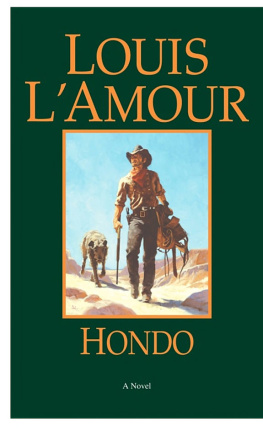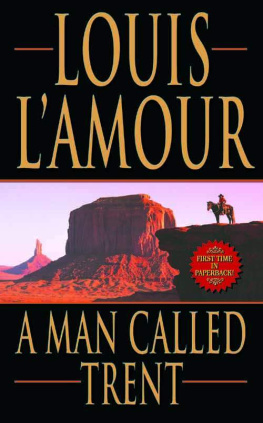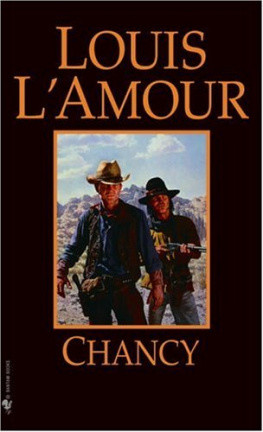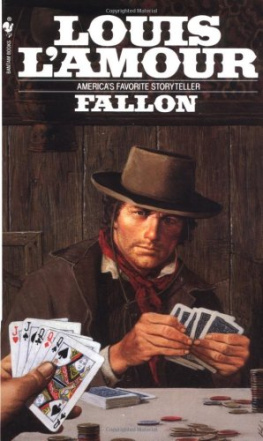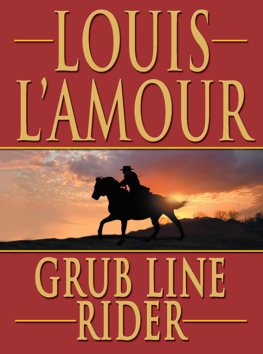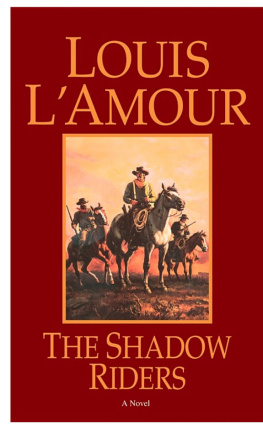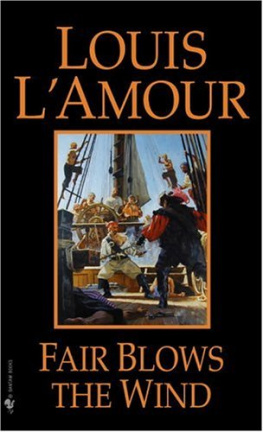Louis LAmour - Where the Long Grass Blows
Here you can read online Louis LAmour - Where the Long Grass Blows full text of the book (entire story) in english for free. Download pdf and epub, get meaning, cover and reviews about this ebook. year: 2005, publisher: Bantam, genre: Detective and thriller. Description of the work, (preface) as well as reviews are available. Best literature library LitArk.com created for fans of good reading and offers a wide selection of genres:
Romance novel
Science fiction
Adventure
Detective
Science
History
Home and family
Prose
Art
Politics
Computer
Non-fiction
Religion
Business
Children
Humor
Choose a favorite category and find really read worthwhile books. Enjoy immersion in the world of imagination, feel the emotions of the characters or learn something new for yourself, make an fascinating discovery.

- Book:Where the Long Grass Blows
- Author:
- Publisher:Bantam
- Genre:
- Year:2005
- Rating:5 / 5
- Favourites:Add to favourites
- Your mark:
- 100
- 1
- 2
- 3
- 4
- 5
Where the Long Grass Blows: summary, description and annotation
We offer to read an annotation, description, summary or preface (depends on what the author of the book "Where the Long Grass Blows" wrote himself). If you haven't found the necessary information about the book — write in the comments, we will try to find it.
Where the Long Grass Blows — read online for free the complete book (whole text) full work
Below is the text of the book, divided by pages. System saving the place of the last page read, allows you to conveniently read the book "Where the Long Grass Blows" online for free, without having to search again every time where you left off. Put a bookmark, and you can go to the page where you finished reading at any time.
Font size:
Interval:
Bookmark:
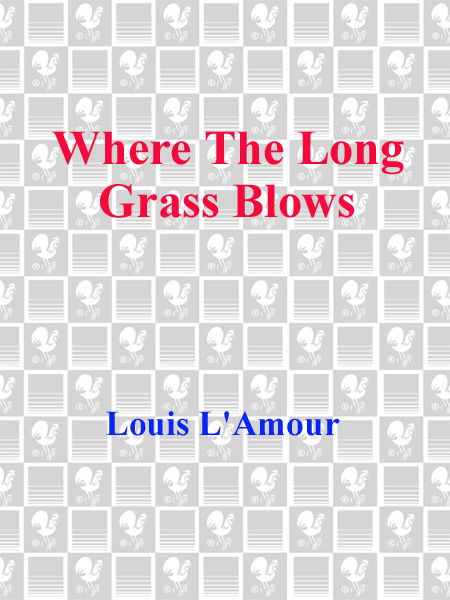
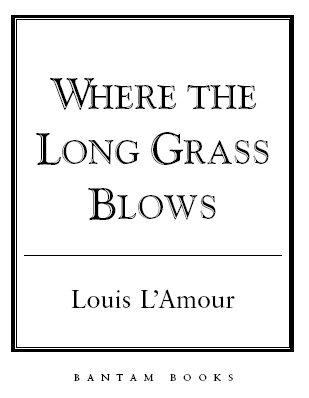
Contents
CHAPTER 1
_____________________
T HERE WAS A lonely place where the trail ran up to the sky, turning sharply away at the rimrock where a man could see all the valley below, a splendid green of forest and meadow fading into the purple of the farther mountains. It was a place where a man could look down upon eagles, soaring far below, yet thousands of feet above the valleys floor. Here at sundown a man came riding.
Bill Canavan rode a horse strangely marked, a true leopard Appaloosawhite with black spots except for a splash of blue roan on the left hip. He drew up where the trail turned, and sat his saddle, looking over the valley below. The gelding, nostrils spreading to catch whatever scent there was, pricked its ears and looked eagerly toward the wide valley below.
The rider was a tall man, narrow of hip and broad of shoulder, his features blunt and rugged, not handsome but strong. There was a tough, confident look about him, and he looked upon this valley now as Cortez might have looked when first he saw the Valley of Mexico.
Bill Canavan came alone, but he did not come seeking favors, nor even work. He came as a conqueror.
For Bill Canavan had made his decision. At twenty-seven he was sitting in the middle of all he owned, a splendid Appaloosa gelding, a fine California saddle of hand-tooled leather, a .44 Winchester rifle and two walnut-butted Colt .44 pistols. These were his all. Behind him was a life that began with birth in a covered wagon rolling westward, a boyhood in the gold and silver boom camps of California, Nevada, Montana and Colorado, a cattle-drive over the Chisholm Trail, another over the Goodnight-Loving Trail, shotgun guard on a stage and scouting Indians for the Army.
He had fought rustlers and Kiowas, Comanches and Apaches, Sioux and Blackfeet, with nothing to show for it but a few scars here and there and his memories of hunger, thirst, cold, of hard winters and dry range and long dusty drives. All it had brought him was trouble and hard riding. Now his decision was made. He was going to ride for himself and fight for himself.
His cool dark eyes scanned the valley below, and his appreciation of terrain would have done credit to a general. And in his own way he was a general, and his arrival was an invasion, yet the only force he commanded was himself.
Bill Canavan was a young man with a plan. He wanted not wealth but a ranch, a well-watered ranch in good stock country, and he intended to settle for nothing less. The fact that he was down to his last three dollars meant nothing, for his mind was made up. And back down the trail there were men who could tell you that Bill Canavan with his mind set on something was a force with which to reckon.
Yet he was not riding blindly into a strange land. For, like the tactician he was, he had gathered his information carefully, judged the situation, the terrain, the time and the people, and now he was ready.
This was new country, but he knew the landmarks and the personalities. He knew the strengths and weaknesses of its rulers, knew the economic factors of their existence, knew the stresses and strains within it. He knew that he rode into a valley at war, that blood had been shed and that armed men rode its trails night and day. Into this maelstrom he rode, a man alone, determined to have his own from the country.
The wolves were at war over the carcass of the land, and he, a stranger, fiercer predator, was moving to the attack.
He turned the gelding away from the rim and started down the trail through the pines, a trail soon to be dark, a trail somber, majestic in its stillness under the columned trees.
As he rode into the trees he removed his hat and slowed his horse to a walk. It was a good country, a country in which a man could live and grow, and where if he was fortunate he might have sons to grow tall and straight beside him.
This was what he wished for. No longer did he look for far horizons. He wanted his own hearth fire, the creak of his own pump, the heads of his own horses looking over the gate bars for his hand to feed them. He wanted peace, and seeking it he had come to a land at war.
A faint smell of woodsmoke drew his attention to the edge of the meadow. He drew up, then walked his horse over to where the fire had been. The earth was much trampled and the grass torn. Studying the scene, his attention held for an instant on a blackened ring at one side and back from the fire.
His eyes glinted with hard humor. A cinch-ring artist, he said to the gelding, dropped her there to cool and singed the grass. A pretty handy man, no doubt, but not a wise one. A smarter or less confident man would have pulled up that handful of blackened grass and thrown it into the fire.
There had been two men here, his eyes told him. Two men and two horses. A big man with small feetthe impressions were deeper and he had mounted the largest horse.
He studied the scene. This was a new country for him and it behooved a man to understand the local customs. He grinned at the thought. If cinch-ring branding was one of the local customs, it was an unusual one. In most parts of the country it was an invitation to a hanging. The cinch-ring artist was apt to find himself at the wrong end of a rope with nothing under his feet.
The procedure was simple enough. One took a cinch-ring from his own saddle gear and, holding it with a couple of sticksafter it was red-hot, of coursehe used it like any other branding iron. A good hand with a cinchring could easily duplicate any known brand, depending only on his degree of skill.
Bill Canavan glanced around. If he were found on the spot it would require explaining, and at the moment he had no intention of explaining anything. Swinging the gelding, he rode down the trail once more.
Not three miles away lay the cowtown known as Soledad. To his right, and about six miles away, was an imposing cluster of buildings shaded beneath a fine grove of old cottonwoods. Somewhat nearer and also shaded was a somewhat smaller ranch.
Beyond the rocky ridge that stretched an anxious finger into the lush valley was Walt Pogues Box N spread.
The farther ranch belonged to Charlie Reynolds; his CR brand was the largest in the area. The nearer ranch belonged to Tom and Dixie Venable.
When thieves fall out, he said aloud, honest men get their dues. Or so they say. Without laying any claim to being more than average honest, Ive got a hunch Ill be around to pick up the pieces. Theres trouble coming, and when the smoke of battle blows away Ill be top-dog on one of those ranches.
They have it all. They have range, money, power. They have gunhands riding for them, but you and me, Rio, weve only got each other.
Down there the wolves ran in packs, but he would circle the packs alone, and when the moment came, he would move in.
Theres an old law, Rio, that only the strong survive. Those ranches are held by men who were strong. Some of them still are. They were strong enough to take the land from smaller, weaker men. Thats the story of Reynolds and Pogue. They rustled cows until they grew big enough and now they sit on the housetops and crow. Or they did until they began fighting each other.
Your reasoning, the cool voice behind him was feminine, is logical, but dangerous. I would suggest that if you must talk to your horse you be sure his are the only ears present!
She sat well in the saddle, poised and alert. There was a quirk of humor at the corners of her mouth, and nothing of coyness or fear in her manner. Every inch of her breathed of quality, but a quality underlaid with both fire and steel.
Next pageFont size:
Interval:
Bookmark:
Similar books «Where the Long Grass Blows»
Look at similar books to Where the Long Grass Blows. We have selected literature similar in name and meaning in the hope of providing readers with more options to find new, interesting, not yet read works.
Discussion, reviews of the book Where the Long Grass Blows and just readers' own opinions. Leave your comments, write what you think about the work, its meaning or the main characters. Specify what exactly you liked and what you didn't like, and why you think so.

